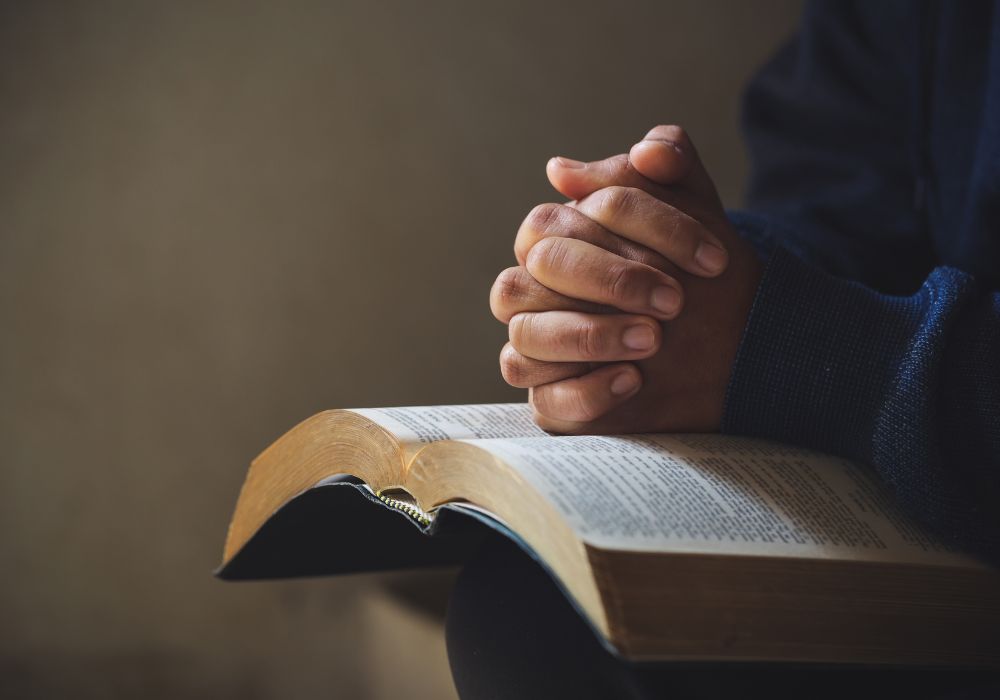For me, prayer is a surge of the heart; it is a simple look turned toward heaven, it is a cry of recognition and of love, embracing both trial and joy.
– St. Thérèse of Lisieux
Let my prayer be counted as incense before you…
– Psalm 141
What is prayer all about?
Clement of Alexandria, a popular teacher of the early Church, put it simply: “Prayer is conversation with God. “Like any conversation, it goes both ways. We talk to God, and He talks to us. God loves us more than we can imagine. He wants us to get to know and love Him as a Father. Like any loving parent, He wants to spend time talking with His children.
What kind of conversation am I supposed to have?
Think of it this way: Imagine that someone saved your life through an act of great personal sacrifice. What kind of conversation would you want to have with that kind of Benefactor?
You would no doubt want to offer an earnest thank you. You would be eager to praise the person’s kindness, generosity, and selfless-ness. You would probably ask, “How can I ever repay you?”
Now think about what God has done for us. He created us and gives us life. Every good gift we have is from Him. When the human race turned away from Him and lost its way because of sin, He made the most precious sacrifice possible to save us and bring us back to Himself. He sent His own Son, Jesus Christ, to die for us.
What kind of conversation should you have with that kind of Benefactor? For starters, you can express to Him sincere praise and thanks.
Doesn’t prayer include asking God for something?
Of course! Think of a small child who is hungry. If the child comes to Daddy asking for food, he’s delighted to answer that request. And if human fathers, Jesus reminded us, know how to give good gifts to their children when asked, “how much more will your Father who is in heaven give good things to those who ask him!” (Matthew 7:9-11)
In fact, most of the Our Father is devoted to this important aspect of prayer: petition. We ask God to provide for us (“our daily bread”), guide us (“lead us not into temptation”), and protect us (“deliver us from evil”). He cares about us, and He’s delighted to answer our prayers. “Have no anxiety about anything,” St. Paul insisted,” but in everything by prayer and supplication, with thanksgiving let your requests be made known to God” (Philippians 4:6). Just tell God what you need.
What about praying for others?
Another important aspect of praying we can’t forget is intercession, which is prayer for others. St. Paul urged that intercessions “be made for all” (1 Timothy 2:1).
Everyone has some need for God’s help. It’s your privilege to ask for it on their behalf. Even if you know that they themselves are praying, you can join them in their requests. Our heavenly Father is pleased to see His children helping one another that way.
When you pray for others, you find that your own life changes. Your heart grows warmer toward people in need. You’re not as upset by the difficulties in your own life, because you’re more aware of the troubles other people have. You find yourself more willing to
help people in other ways as well.
It’s not easy, but God calls us to pray even for our enemies. Jesus set the example. As He died on the cross, He prayed for His killers: “Father, forgive them” (Luke 23:34). Praying for people who have offended or injured us actually makes it easier to forgive them and to see them more as God sees them. It can also lead us to recognize more clearly the times when we offend or injure others.
Does God always hear our prayers?
We can have the same confidence Jesus had when He prayed: “Father…I [know] that you always hear me” (John 11:42). And God not only hears our prayers; He answers them as well. Nevertheless, His answer isn’t always the one we’re hoping to hear. Sometimes we ask for the wrong things – things we would regret having if He gave them to us. Sometimes what we want doesn’t fit into the bigger, wiser plan He has for us and for those around us. Sometimes He’s allowing us to develop patience or to grow in some other way.
In any case, we can always pray to God in faith. That doesn’t mean we try to convince ourselves that everything we ever ask for, we’ll receive. Instead, it means that we pray with trust in the Father who listens to our prayers, confident that He wants what’s best for us; He knows what’s best for us; and He’s able to give us what’s best for us. Our prayers should always ask for God’s will.
How do I find the right words to pray?
God listens even when we’re not sure what to say. Catholics often pray using composed prayers. It’s called formal prayer, because it has a set “form,” rather than being spontaneous.
Jesus gave us a formal prayer when He taught His disciples the Lord’s Prayer (Matthew 6:9-12). He and His apostles used formal prayers in worship, often from the Psalms, because this was the ancient custom of the Jewish people. The Church has followed their example in the Mass and in other settings. When Catholics pray using the words given us in Scripture and Tradition, we are guided by these formal prayers as we search for words to express ourselves to God.
When we make these common prayers our own, we find ourselves praying in unity with the whole Church. We become part of a timeless, global community of prayer, a sign that we all belong to “the household of God” (Ephesians 2:19).
The Lord’s Prayer is the most perfect of prayers…. In it we ask, not only for all the things we can rightly desire, but also in the sequence that they should be desired. This prayer not only teaches us to ask for things, but also in what order we should desire them.
St. Thomas Aquinas
An easy way to remember the different kinds of prayer is ACTS:
A- Adoration
C-Contrition
T-Thanksgiving
S-Supplication
How do I know when God is talking?
It’s important to give Him time to talk, a few quiet moments when you’re listening for Him. On those occasions you may have thoughts or impressions come into your mind from God: a word of comfort, a solution to a problem, a prompting to take a particular
action.
There are other ways to listen to God as well. Reading Scripture or helpful spiritual books may allow Him to speak to you through the printed word. God may speak through others who say that you came to mind during their own prayer time. Sometimes God simply answers you through situations, opening one door and closing another.
If you think God is saying something that puzzles or disturbs you, it’s a good idea to talk it over with a priest or another trusted friend.
When should I pray?
We can pray anytime, of course, since God is always listening. Many Catholics even say little “mini-prayers” throughout the day as they go about their business, such as “Thank you, Lord,” or “Jesus, help me.” But over the centuries believers have also
developed habits of praying at certain hours because they found it helped them to
recognize God and seek His will at important junctures of the day.
Many people, for example, dedicate the day to God as soon as they wake up. Asking God’s blessing is an important way to begin meals and recognize our dependence on His provision. At bedtime, many Catholics review the day as it closes, examine their consciences, and say a prayer of confession and contrition.
What are some Catholic prayer traditions?
- Mass and Eucharistic Adoration – “The Eucharist contains and expresses all forms of prayer: it is the pure offering of the whole Body of Christ to the glory of God’s name and according to the traditions of East and West, it is the ‘sacrifice of praise.” (Catechism of the Catholic Church (CCC) 2643).
- Liturgy of the Hours – The public prayer of the Church for praising God and sanctifying the day. It is required of priests and Religious and highly recommended for the laity. The Psalms, biblical and non-biblical readings are reflected upon during morning, daytime, evening and night prayer.
- Stations of the Cross – A form of devotion commemorating the passion and death of Christ, consisting of meditations, also called the Way of the Cross. There are 14 traditional Stations that begin with “Jesus is condemned to death” and end with “Jesus is buried.”
- Scripture – Vatican II advised that Scripture can serve “the children of the Church as strength for their faith, food for the soul, and a pure and lasting font of spiritual life.” The Psalms, particularly, are timeless and appropriate for everyone, no matter their circumstances.
- Praying the Jesus Prayer – A prayer favored by Eastern Catholics has grown in popularity throughout the Universal Church in recent years. “This prayer of the heart, the Jesus Prayer, says: ‘Lord Jesus Christ, Son of God, have mercy on me, a sinner.’” (CCC 435) The words of the prayer are repeated over and over as a way of “praying always.”
- Prayers for All Times and Occasions – We pray to celebrate good times and to ask for strength and perseverance in bad times. We pray for the living and the dead. “Prayer is the life of the new heart. It ought to animate us at every moment” (CCC 2697).
The best way to learn about prayer is to do it. God is eager to talk with you. Weave prayer throughout every day. To spend time talking with God consistently, it’s probably best to set aside a regular time and even a particular place – to pray each day. That way you’ll build a daily habit of prayer, which will enrich your life abundantly.









